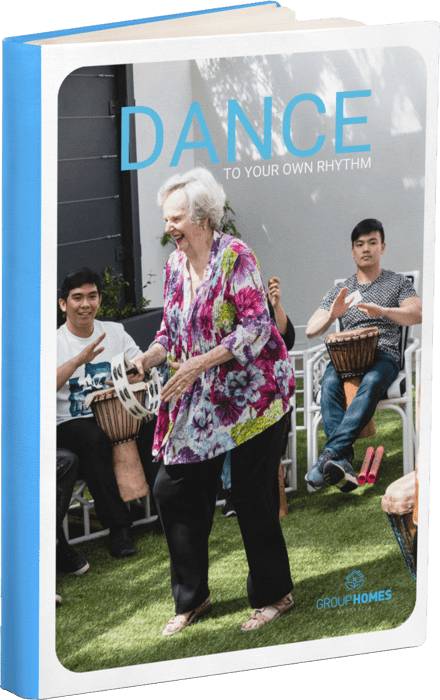Every person living with dementia will do it differently. It’s like a dance.
Some days are perfectly in time with the music and seamlessly intertwine with those around you. Some days are clumsy and out of sync with the people and the world we live in.
We understand when a loved one receives a diagnosis, it doesn’t just affect them. There is a huge impact on their support network.
We are interested in your life story and how this will impact your own dance.
Please find “Dance to your own Rhythm” which includes helpful advice for caregivers below.

Every person living with dementia will do it differently. It’s like a dance. Some days are perfectly in time with the music and seamlessly intertwine with those around you. Some days are clumsy and out of sync with the people and the world we live in.
Within the industry, you may have heard that there are stages and phases of dementia. At Group Homes Australia we prefer to encourage families and those living with dementia to take each day as it comes. We encourage you to celebrate cherished moments and work through the challenging situations one day at a time. No two people’s unfolding story the same. There is no one size fits all approach to a persons diagnosis. The changes for someone living with dementia are not linear.
As a person dances with dementia, there will be parts of their life story that they will remember and parts that will peel away as their dance progresses. Dementia doesn’t only impact memory, it will impact every facet and layer of life.
It’s important to note that when we talk about a person living with dementia, we are referring to two people: the person with the diagnosis and their care partner. The care partner needs as much love and attention as the person with the diagnosis. Sometimes the care partner can go under noticed and forgotten, because the focus is on the person with the diagnosis. Please remember to take care of yourself and reach out to people that care.

Tamar Krebs
FOUNDER
GROUP HOMES AUSTRALIA
Why is a cherished moment important?
When someone is living with dementia, often people will ask: Can they experience joy even if they cannot remember the moment? Do we need memory to experience moments of happiness? Do we need memory to be able to cherish and appreciate a moment in time?
A moment is when time stands still, and an experience gets embedded in our memory. And from time to time, we choose to look back at that moment, and recall that memory. That memory may spark emotions of joy and happiness and leave us with a positive feeling.
A cherished moment is like throwing a rock into a lake, it creates a splash, a moment in time, and after the splash, there are ripples. Those ripples are the memories and feelings of that moment in time.
Cherished moments are essential to the emotional equilibrium of someone living beyond a diagnosis of dementia. It is part of what determines their rhythm and their mood for the day. If a person has a positive experience, whether it be waking up in the morning and having a warm cup of tea, being at a family gathering or going for a beautiful winter walk, all of these experiences will create a ripple effect which impact their mood. They may not always remember the experience in detail, or even the experience at all, but they will be left with a positive feeling, created by the cherished moment.
What does it mean to step into someone’s reality?
In traditional dementia care, there is this school of thought that says you should never lie to someone living with dementia. People use strategies such as re-orientation, re-direction, diversion, distraction and/or validation. Another tool to consider is stepping into their own reality.
At Group Homes Australia, we recognise that there are two (2) realities when caring for someone living with dementia – the resident’s reality and our reality. Our reality is the here and now, who that person is now and their diagnosis. However, for a person living with dementia, their reality could be any point in their life, from their lived timeline, and this can change day to day.
They can be stuck in a moment in time, as a child needing to get home for dinner, or a young professional needing to go to work, and even a parent needing to make dinner for their young kids, when in our reality these children are in their mid-40s and live far away.
Entering into a persons reality is the ability to be present in what is real to them in that moment and not force them into our own reality, leaving them shamed and disorientated. Often family will use the phrase “don’t you remember that…?”. Having the ability to step into their reality gives them a sense of comfort and orientation.
In order to step into someone’s reality here are a couple of tips:
Listen
Listen for clues of where that person is in that moment in time, of that persons lived timeline. Each day is going to be different, so don’t assume that if they were living in a particular timeframe yesterday, they will be in there today. So listen for cues to be able to identify where they are.
Validate
Validate and legitimise everything they say. If they say they need to go home to make dinner for the kids, your response should be “what do your kids like to eat for dinner?”, instead of arguing that the kids are longer at home and they don’t need dinner made for them.
Be prepared
Be prepared for them to step out of that reality and into a different space. It is not up to you to keep them stuck in a particular timeframe. It is up to you to listen, learn and remain curious.
What’s the timeline that your loved one is living to?
Read our related resource: 9 tips for caring for someone at home.
Do you need a moment to reset?
Is it time to consider permanent care?
If we can assist with answering any further questions, please don’t hesitate to contact our Engagement Manager on 1300 953 196
Join us to explore, connect and share:
- Community residents who choose our care live in one of our group homes. Only 6-10 residents live in each home.
- Our innovative model of care is an alternative to traditional aged care facilities.
- Smaller care environments have been proven to increase quality of life, reduce rates of depression and reduce hospitalisation for people living with dementia.
